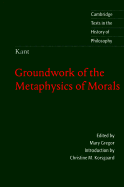Book contents
- Frontmatter
- Contents
- Introduction
- Chronology
- Further reading
- Groundwork of the Metaphysics of Morals
- Preface
- Section I Transition from common rational to philosophic moral cognition
- Section II Transition from popular moral philosophy to metaphysics of morals
- Section III Transition from metaphysics of morals to the critique of pure practical reason
- Notes
- Selected glossary
- Index
- Title in the series
Introduction
- Frontmatter
- Contents
- Introduction
- Chronology
- Further reading
- Groundwork of the Metaphysics of Morals
- Preface
- Section I Transition from common rational to philosophic moral cognition
- Section II Transition from popular moral philosophy to metaphysics of morals
- Section III Transition from metaphysics of morals to the critique of pure practical reason
- Notes
- Selected glossary
- Index
- Title in the series
Summary
A life devoted to the pursuit of philosophical discovery may be inwardly as full of drama and event – of obstacle and overcoming, battle and victory, challenge and conquest – as that of any general, politician, or explorer, and yet be outwardly so quiet and routine as to defy biographical narration. Immanuel Kant was born in 1724 in Königsberg, East Prussia, to a Pietist family of modest means. Encouraged by his mother and the family pastor to pursue the career marked out by his intellectual gifts, Kant attended the University of Königsberg, and then worked for a time as a private tutor in the homes of various families in the neighborhood, while pursuing his researches in natural science. Later he got a position as a Privatdozent, an unsalaried lecturer who is paid by student fees, at the University. There Kant lectured on logic, metaphysics, ethics, geography, anthropology, mathematics, the foundations of natural science, and physics. In 1770, he finally obtained a regular professorship, the Chair of Logic and Metaphysics, at Königsberg. Because of limited means and variable health, Kant never married or travelled. He remained in the Königsberg area, a quiet, hardworking scholar and teacher, until his death in 1804.
But some time in the 1770s – we do not know exactly when – Kant began to work out ideas that were destined to challenge our conception of reason's relationship – and so of our own relationship – to the world around us.
- Type
- Chapter
- Information
- Kant: Groundwork of the Metaphysics of Morals , pp. vii - xxxPublisher: Cambridge University PressPrint publication year: 1998
- 2
- Cited by

